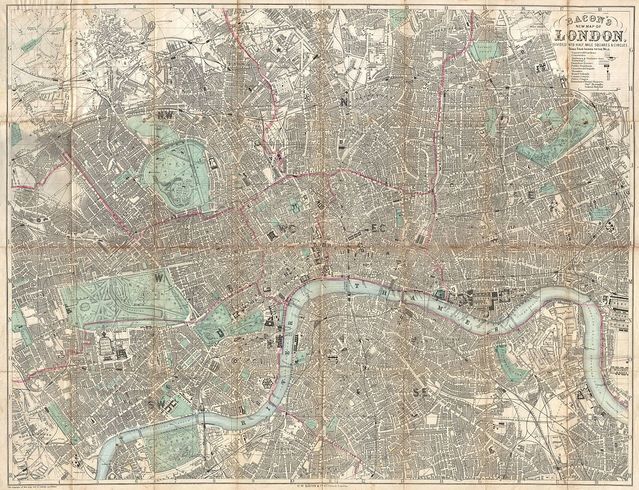
Source: "Bacon's New Map of London Divided into Half Mile Squares & Circles" by George Washington Bacon, from Wikimedia.
This post was co-authored by Steve Weisberg, Ph.D.
Imagine being a taxi driver before cars and phones had GPS systems: A passenger enters your cab and asks you to take them to a restaurant. Maybe she cannot tell you the street address, associated landmarks, or even the part of town in which the restaurant is located. Finding the restaurant and the best route to get there would have been your job. You would have had to be an expert navigator.
To become a taxi driver in London is to become a human GPS. Getting a license requires passing a 5-stage test ominously called “The Knowledge.” Mastering The Knowledge takes years and entails learning 320 paths between various landmarks, throughout the London sprawl, whose streets can be fairly if not inadequately described as complex. Taxi drivers’ knowledge of London is so thorough that the very existence of their skills suggests that it is possible for humans to build what scientists call a cognitive map—a mental representation of space used to calculate distance, directions, and routes between places.
Since at least the 1970s, when O’Keefe and Nadel published The Hippocampus as a Cognitive Map, scientists have postulated that map-like representations are created in an area of the brain called the hippocampus. The evidence supporting this idea came from studies in rodents showing that neurons in the hippocampus fire when rodents are in certain locations of an enclosure.
London taxi drivers provided a unique window into how the brain might acquire and use spatial knowledge. MRI scans of taxi drivers’ brains show that, compared to results before training in The Knowledge, these people have large posterior hippocampi. These data support the hypothesis that an expert navigator engages their hippocampus more often and more deeply, leading to larger hippocampi.
As navigators, most of us are nowhere near as skilled as London taxi drivers. But everyday navigators still vary widely in how accurately they represent space. Some people are remarkably adept at building map-like representations (Weisberg & Newcombe, 2018). Because of the neuroanatomic observations in London taxi drivers, we wondered whether normal variations in navigation ability would correlate with hippocampal volume.
We tested this idea using a virtual environment modeled on a real college campus. (If you have a fast enough computer, you can test it here.) In this virtual environment, which we call Virtual Silcton, our everyday navigators traveled along two separated routes while learning the names and locations of eight buildings. Then they learned two routes that connect the first two routes, providing spatial information about how the first two routes might be integrated.
People vary in how well they master this environment. In our sample of participants, we wanted to learn if hippocampal volume correlated with the accuracy of navigator’s cognitive maps. We found no correlation between hippocampal volume and navigational accuracy.
What do we make of these observations? One possibility is that hippocampal volume reflects the consequences of information storage, rather than computational potential. In other words, the hippocampus is like a muscle and responds to having been exercised vigorously. London taxi drivers have done the heavy exercising required to grow their hippocampus. Good navigators, but non-experts, are qualitatively different: Even though they can build a cognitive map, they have not done so extensively enough to produce a change in their hippocampal volume.
Consistent with this interpretation, Alzheimer’s patients and people with damage to the hippocampus have trouble with navigation. Without the hippocampus, these patients do not even have the muscles to exercise, and thus are unable to build cognitive maps.
Since Franz Gall’s attempts at phrenology, cognitive neuroscientists have tried to associate neural structure with function. We are now farther along than thinking that bumps on the skull relate to cognitive abilities or personality traits. But what is the physical correlate of expertise in the brain? At least in the case of spatial navigation, the answer is not simple.
The very technology that enables us to seamlessly navigate anywhere in the world while barely engaging our own inner GPS might have implications for the future development of navigation abilities. In the modern age, misplacing our GPS devices might well be the equivalent of damaging our hippocampi.
"brain" - Google News
November 06, 2019 at 04:06AM
https://ift.tt/34DjhwK
GPS in the Brain - Psychology Today
"brain" - Google News
https://ift.tt/2W2PMS9
Shoes Man Tutorial
Pos News Update
Meme Update
Korean Entertainment News
Japan News Update
No comments:
Post a Comment